Christopher Noetzel, PhD
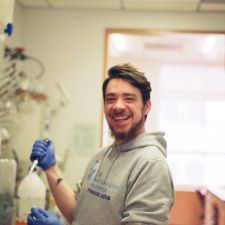
As different tissues in the body form, cells need to undergo a complex, precisely timed series of differentiation programs to form specialized cell types. Importantly, premature or delayed initiation of these programs can contribute to cancer formation. However, how timing of cellular differentiation is encoded on a molecular level is poorly understood. Dr. Noetzel [Merck Fellow] is using the protozoan parasite Cryptosporidium parvum as a simplified model of eukaryotic differentiation. After infecting the intestinal lining of a mammalian host, these single-celled parasites undergo exactly three rounds of asexual replication before collectively differentiating into gametes. These studies will investigate how this hard-wired, intrinsic developmental timer is encoded. In his project, Dr. Noetzel aims to understand how these parasites "count to three," which will inform our basic understanding of how eukaryotic cells keep track of time during development. Dr. Noetzel received his PhD from the Weill Cornell Medical College, Cornell University, New York and his MSc and BSc from Georg-August-University, Göttingen.
Archana Krishnamoorthy, PhD
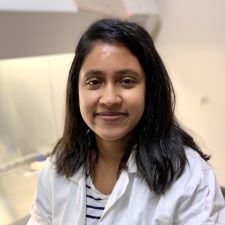
Cancer initiation and progression stems from cell division errors that promote chromosome breakage and accumulation of mutations. Dr. Krishnamoorthy [HHMI Fellow] will use cutting-edge, cross-disciplinary approaches to provide insights into the fundamental question of how cell division shapes the cancer genome. Understanding the mechanisms of cancer genome complexity will help identify better diagnostics and treatments for cancers linked with high levels of genome alterations. Dr. Krishnamoorthy received her PhD from Vanderbilt University, Nashville and her MS from Middle Tennessee State University, Murfreesboro and her BS from PES Institute of Technology, Bangalore.
Joshua B. Sheetz, PhD
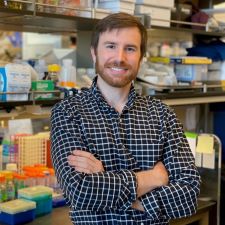
Cancer cells adapt their metabolism to achieve rapid growth and proliferation. Much of their metabolic malleability hinges on mitochondria, subcellular hubs for energy transformation and biosynthesis. As a key means to control mitochondrial composition and meet metabolic demands, cells mark mitochondrial proteins for degradation by a process called ubiquitylation. How both cancerous and healthy cells direct and monitor mitochondrial ubiquitylation remains poorly understood. Dr. Sheetz [HHMI Fellow] aims to dissect the cellular machinery that performs mitochondrial ubiquitylation and determine how this process promotes metabolic adaptability in cancer cells. A major translational goal is to identify approaches for tuning the levels of mitochondrial ubiquitylation in tumors and in metabolic disorders that put patients at risk for cancer. Dr. Sheetz received his PhD from Yale University, New Haven and his BS from the University of North Carolina, Chapel Hill.
Ryan Y. Muller, PhD
The PABPC1 protein has diverse roles in gene expression control that span functions in mRNA stability, polyA tail length control, and translation regulation. PABPC1 gene amplifications are detected in roughly 4% of cancer samples, but it is unclear how PABPC1 fits into the picture of cancer progression. Dr. Muller [HHMI Fellow] studies the sequence preferences of PABPC1 protein to understand the mechanistic details that determine which transcripts are subject to PABPC1-mediated regulation. Connecting these sequence preferences to the mis-regulation caused by excess PABPC1 may provide a therapeutic handle for cancers that contain PABPC1 gene amplifications. Dr. Muller received his PhD from the University of California, Berkeley and his BS from Arizona State University, Tempe.
Hui (Vivian) Chiu, PhD
Fatigue is the most common symptom experienced by patients with cancer or undergoing cancer treatment. While chronic inflammation and hormonal imbalance have been suggested as possible causes, the roots of cancer-related fatigue remain unclear and thus we lack effective treatments. Dr. Chiu [HHMI Fellow] seeks to illuminate the physiological basis of fatigue using interdisciplinary approaches that combine the strengths of neuroscience, immunology, and computational biology. Through the lens of brain-body interactions, Dr. Chiu aims to identify key molecular and cellular components of fatigue with the goal of improving treatments for cancer and other severe diseases, such as long COVID. Dr. Chiu received her PhD from the California Institute of Technology, Pasadena and her MS and BS from the National Taiwan University, Taiwan.
Titas Sengupta, PhD
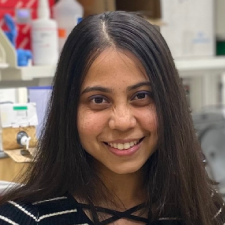
An organism’s life experiences, such as exposure to bacterial pathogens, can cause sustained changes in its physiology and behavior. How these experiences are encoded in heritable RNA and DNA-associated proteins (called chromatin), and how these in turn affect the physiology of the organism itself and its progeny, are not well understood. Previous research has shown that the roundworm C. elegans can “read” small non-coding RNAs from the pathogenic bacterium Pseudomonas aeruginosa and learn and teach its progeny to avoid this bacterium. Dr. Sengupta’s [Rebecca Ridley Kry Fellow] research investigates how bacterial small RNAs taken up in the intestine can result in lifelong, multigenerational, and organism-wide changes at the epigenetic (RNA and chromatin) level to regulate brain function and behavior. She will investigate which small RNA and chromatin-associated genes are required for the learned response, where these genes function, and what changes at the epigenetic and gene expression level underlie this response. This will inform principles of epigenetic regulation of gene expression following diverse environmental stimuli, and stimuli within tissue environments, including tumor microenvironments. Dr. Sengupta received her PhD from Yale University and her MS and BS from the Indian Institute of Science Education and Research.
Wen Mai Wong, PhD
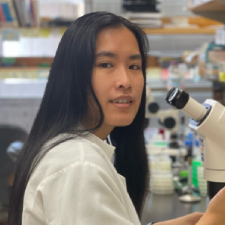
Multiple cancers, including prostate, breast, and gastrointestinal cancers, are known to be heavily innervated. However, the role of neurons and their signaling within the tumor microenvironment remains unknown. Previous work has shown that transecting the vagus nerve can block the progression of gastric cancer, emphasizing a critical role for the vagal neurons in this disease. However, these transections produce side effects, making it a difficult strategy to translate to the clinic. Dr. Wong [Kenneth G. and Elaine A. Langone Fellow] is proposing a new method to non-invasively silence neurons within the body. Specifically, she will use ultrasound to silence specific neurons in rodent models in order to determine the impact of these neurons on animal behavior and disease physiology, including the tumor microenvironment. Dr. Wong received her PhD from the University of Texas Southwestern Medical Center and her BS from St. Mary’s University.
Rebecca S. Moore, PhD
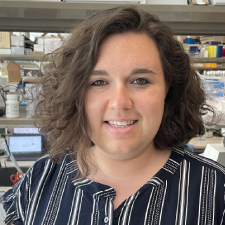
Sleep problems may be a risk factor for developing certain types of cancer—lung, colon, pancreas, and breast—and may affect the progression of these cancers and the effectiveness of their treatment. Conversely, symptoms of cancer or side effects of treatment, including restless legs and obstructive sleep apnea, may cause sleeping problems, reducing quality of life. Understanding the complex relationship between cancer and sleep creates opportunities to improve health, treatment options, and quality of life. Specifically, understanding how the peripheral nervous system and the brain regulate both the timing and rhythmicity of sleep (i.e., circadian control), and the balance between time awake and growing sleep pressure (i.e., homeostatic control), could improve survival rates and the quality of cancer treatment. To this end, Dr. Moore [HHMI Fellow] aims to identify the role of circulating dietary cholesterol on sleep and to conduct a targeted genetic screen to identify peripherally secreted proteins that affect either the circadian or the homeostatic control of sleep. These results will provide a means for therapeutic interventions to ameliorate the effects of sleep disruption. Dr. Moore received her PhD from Princeton University and her MS and BS from the City College of New York.
Erron W. Titus, MD, PhD
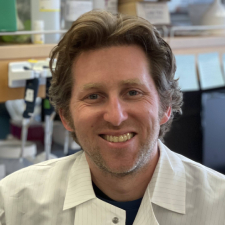
Chimeric antigen receptor (CAR) T cells are immune cells that have been genetically engineered to bind specific proteins on cancer cells. CARs can display exquisite sensitivity and discrimination, and CAR T cells have been deployed with spectacular success to detect and kill blood cancers. Unfortunately, they are much less effective against “solid” tumors, such as breast or kidney cancers. To address this problem, Dr. Titus [Connie and Bob Lurie Fellow] is designing T cells with membrane proteins that perform novel functions, including proteins that facilitate membrane fusion or alter the adhesion between T cells and their targets. By redesigning T cell membranes, Dr. Titus hopes to create useful cancer-fighting tools that can be deployed in conjunction with other emerging cellular therapies and immunotherapies. Dr. Titus received his MD and PhD from the University of California, San Francisco, and his AB from Harvard University.
J. Scott P. McCain, PhD
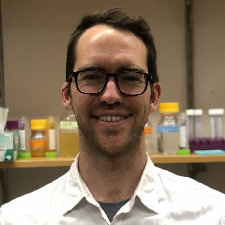
One of the defining features of cancerous cells is that they divide quickly. The composition of the human microbiome is also due to differences in how quickly microbes grow. How do we determine how fast cells are growing in their natural environments? Is there a way to take a ‘snapshot’ and turn it into a ‘growth rate’? More fundamentally, what limits these growth rates? These are the fundamental problems Dr. McCain is studying. He is using computational simulations, machine learning, and experiments with bacteria to identify a common set of transcriptomic and proteomic biomarkers for estimating growth rates. In addition, he is examining the biophysics of growth limitation as a function of organism size. This work will provide fundamental insights into the use of gene expression data to inform and quantify key processes, like growth rate. Dr. McCain received his MSc and PhD from Dalhousie University and his BSc from the University of Western Ontario.
